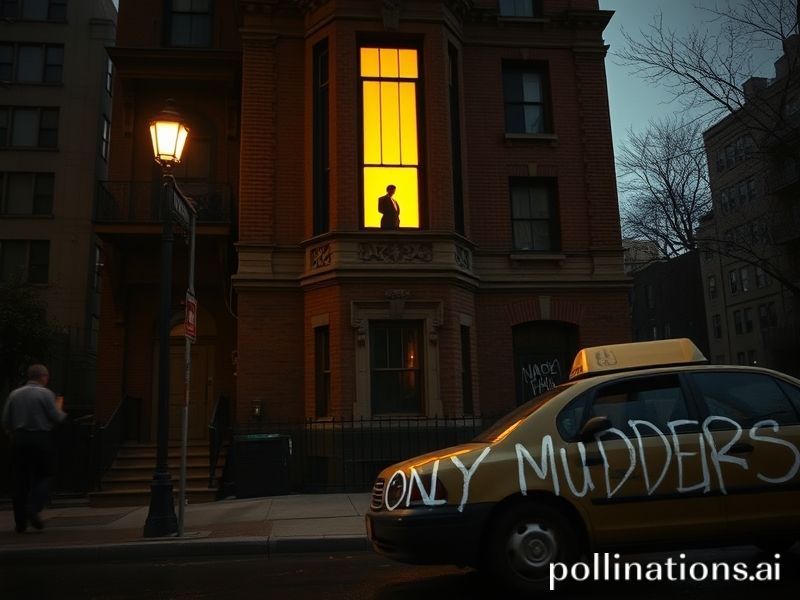How ‘Only Murders in the Building’ Quietly Conquered the World—One Corpse and Podcast at a Time
Only Murders in the Building: How Three Lonely New Yorkers Became the World’s Most Relatable Diplomats
By Our Bureau Chief, Still Recovering from a Long Layover in Newark
It began, as most modern catastrophes do, with a podcast. Somewhere between the collapse of global supply chains and the rise of artisanal oxygen bars, three residents of a creaking Manhattan apartment block—an aging TV has-been, a washed-up Broadway director, and a twenty-something artist who treats trauma like a side hustle—decided that amateur homicide investigation was the logical next hobby. Their show, “Only Murders in the Building,” is nominally about murder, but viewed from the international cheap seats it’s really a soft-power masterclass: the United States exporting its most durable commodities—nostalgia, paranoia, and real-estate envy—to a planet that has already stockpiled plenty of each.
The genius is in the packaging. While other nations scramble to build semiconductor plants or renegotiate grain corridors, America repackages loneliness as premium content and ships it worldwide via Hulu and Disney+. The subtitles alone constitute a quiet act of linguistic imperialism; by episode three you can watch a Tokyo commuter giggling at Steve Martin’s geriatric pratfalls or a Lagos Uber driver arguing that the Arconia’s doorman is obviously the killer because “security guards always know too much.” Somewhere in Brussels, an EU cultural attaché files the series under “soft propaganda,” right next to Friends and the notion that avocado toast builds character.
For viewers abroad, the show’s real suspense isn’t whodunit but how much square footage a failed actor can still afford on residuals. Each wide-angle shot of the Arconia’s lobby functions as a stealth tourism ad: come to New York, where even a grisly strangulation comes with crown molding. In countries where housing shortages drive voters to the brink, the series reads like dark satire—imagine Copenhagen’s waiting-list-for-a-waiting-list, then add a corpse. One Berlin critic called it “murder-porn for people priced out of Kreuzberg,” which is either the harshest review or the highest praise, depending on your lease terms.
And yet the world leans in, because the emotional currency is universal. Mabel’s dead-eyed stare translates fluently from Turkish to Tagalog; Charles’s tremulous saxophone riff is the soundtrack to every global midlife crisis. The podcast-within-the-show, meanwhile, satirizes our collective addiction to monetized empathy. From Mumbai call-center break rooms to São Paulo co-working spaces, listeners nod along: yes, we too would turn grief into content if only Spotify’s non-English CPMs weren’t insultingly low.
International diplomacy has taken notice. After a closed-door NATO summit, an anonymous source leaked a proposed “Only Sanctions in the Building” initiative: member states would role-play apartment dwellers, airing grievances in six-episode arcs until Russia agrees to unblock Ukrainian grain. The plan was shelved once diplomats realized the series already contained more effective conflict-resolution techniques than most multilateral treaties—chiefly the radical notion that talking to your neighbors, even the insufferable ones, is marginally less catastrophic than annexing them.
There is, of course, collateral damage. True-crime tourism is now spiking in the Upper West Side; Japanese travel agencies hawk “Arconia-adjacent” Airbnb lofts, complete with complimentary tie-dye hoodies and a 12% chance of discovering a cadaver. Local New Yorkers, ever the gracious hosts, have responded by raising rents and installing extra security cameras—because nothing says “welcome” like biometric surveillance.
Still, the show’s greatest export might be its moral: in an era when every nation is busy building walls—digital, physical, metaphorical—three misfits prove that the most subversive act is still the oldest one: listening through the air vent. Cynics will note that their eavesdropping is immediately commodified; optimists will counter that at least someone, somewhere, is finally paying attention.
As season three drops and the body count climbs, global audiences settle in with the weary satisfaction of commuters boarding the last train home. We know the formula, we see the seams, we understand that the real crime is inflation-adjusted streaming subscription fees. And yet we press play, because the alternative—actual human connection—remains far too expensive, and slightly less entertaining.







